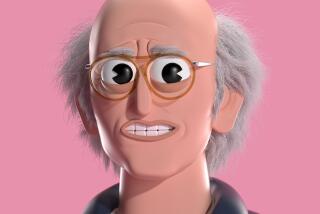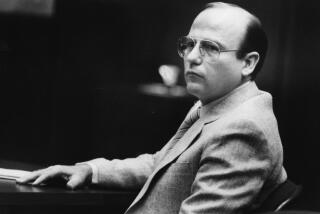The Terminal Man : Timothy Leary is facing death the same way he’s always faced life--like a rebel. He’s even looking forward to it.
- Share via
The man who urged a generation of Americans to “Turn On, Tune In and Drop Out,” is preparing for the ultimate drop out.
Timothy Leary has cancer. And to hear him talk about it, he’s ecstatic.
“When I found out I was terminally ill, and I know this can be misinterpreted, I was thrilled,” says the ever-elfin Leary with enthusiasm. “I was now entered into the real challenge of how to live an empowered life, a life of dignity.”
Leary, 74, sits at the breakfast table of his Beverly Hills home, drawing on the first of the many Benson and Hedges cigarettes he will smoke in the next hour. Although he has always cut a trim figure, he is now painfully thin.
In January he was told he had prostate cancer and that it was too far along for surgery.
“How you die is the most important thing you ever do,” he continues. “It’s the exit, the final scene of the glorious epic of your life. It’s the third act, and you know, everything builds up to the third act.
“I’ve been waiting for this for years.”
This jaunty stance from the former Harvard psychologist who became a celebrity in the 1960s for extolling the use of LSD does not seem to be manufactured solely for the public. Shortly after the cancer was diagnosed, Leary contacted his old friend Ram Das, author of the seminal counterculture spiritual handbook, “Be Here Now.”
“I got a phone call from Timothy and he said, ‘I have two wonderful pieces of news,’ ” says Ram Das, speaking from his home near San Francisco. “I can’t remember what the second one was, but the first was that he had cancer that had metastasized and that he was dying.”
In an interview earlier this month, his first about his current condition, Leary never wavers from the enthusiastic demeanor that has been his public persona for three decades.
Actually, it is more a salon than an interview. As friends and business associates drop by, Leary, never one to turn down an audience, eagerly beckons them to sit at the table and join in the conversation about his pending death.
“This is wonderful,” he enthuses looking around the table and smiling broadly. “This is such a taboo topic, and here we are talking about it.
“I grew up in a culture where you never talked about how much money you made or anything about death. I love topics the Establishment says are taboo.”
Although Leary says he feels no pain, he wears soft slippers to protect his feet and the cushion of his chair is further padded by a pillow. He has sores on his hands and face, caused by a bacterial infection.
Leary is still a household name, but he would probably not be welcome at the breakfast tables of many Americans because of his unwavering promotion of psychedelic drugs as a way to expand consciousness.
But Leary--who in addition to being an ex-college professor, has also been a West Point cadet, actor, gubernatorial candidate, lecturer, software developer, stand-up comedian and convict--relishes his stance as an outsider. There is no surprise that even in death, he plans to go his own way, at the time of his own choosing.
“I use the term ‘voluntary dying,’ ” says Leary. “It’s a nice way of saying ‘killing yourself.’ ”
Leary was on a traditional, professorial career path in the psychology department at Harvard in 1960 when, after an experience with a psychedelic mushroom in Mexico, he began a series of experiments with mind-altering drugs. This led him to contacts with the literary and hip set of the time--Aldous Huxley, Allen Ginsberg, William Burroughs and Charlie Mingus, to name a few--and to his being pressured into leaving Harvard.
But in the mid-1960s, as the hippie movement spread, his fame grew to international proportions. The fame diminished during the 1970s, much of which he spent either in prison on drug and prison escape convictions, or on the run in Africa and Europe.
In 1979 he re-emerged in Los Angeles and became a fixture on the filmland party circuit. He appeared in a handful of movies, the best known of which is “Cheech & Chong’s Nice Dreams,” and most of which are long forgotten.
He lectured widely, wrote an autobiography and got involved in numerous computer and media projects, few of which reached fruition.
It was a far cry from his scholarly past and from the years when he was thought of as an important cultural figure. But Ram Das, even though finding himself in disagreement with Leary on many matters, said his friend’s contributions continued to be significant, especially in fields such as virtual reality.
“Timothy moves fast through things, leaves them half-digested and goes on to something else,” says Ram Das, who before becoming immersed in an Eastern spiritual quest was Richard Alpert, a colleague of Leary’s at Harvard.
“That’s very much the way a visionary works. He moves on, but he leaves a lot of ideas behind. It’s like science fiction. Someone writes about a world but they don’t actually create it. They leave a map for others to follow.”
Leary’s stand-up comedy efforts went almost nowhere, but he did find success in doing a national tour of debates with his former arch-nemesis, Watergate figure and ultra-conservative commentator G. Gordon Liddy. The two men became unlikely friends, even though Liddy in his days as a law official had arrested Leary twice.
“He called me when he was diagnosed and talked about how he was handling it,” says Liddy, from his home outside Washington, D.C. “I promised myself I would get out there to see him, and I will, soon.”
Asked what is the basis for their friendship, Liddy says, “Well, we’re both Irish.”
That notion is not so far-fetched, according to Ram Das.
“It’s the Irish always rebelling against the English and everybody,” Ram Das says. “Tim is a fighter, he is always going up against authority.
“In that sense, treating death the way the culture treats it doesn’t particularly interest him.”
At the beginning of this year, after an arduous lecture tour, Leary contracted pneumonia. “It was the first time in my life I was ill,” he says. “I asked for a complete physical exam, and it came back that I had prostate cancer.”
Soon after getting the news, Leary began to formulate a personal, “quality of life” document to spell out just when he considered life not worth living.
“I have certain fears of losing my dignity,” he says. “Having to be diapered, losing whatever is left of my mental agility.
“I’m tremendously frightened. The only thing I’ve ever been frightened of in my life is that stage of total, undignified, vegetable passivity.”
He says he would like to die at home, with friends present, but he is undecided on many of the details. On one of his wrists is a metal bracelet with the name and phone number of a firm specializing in cryonics.
On his other wrist is a bracelet with the name and number of a rival cryonics firm.
“I want to keep my options open,” Leary says with a laugh.
He says it is a “real possibility’ that he will take a dose of LSD before he dies, but that is undecided, too.
“I like options,” he says. “You’re as young as the last time you changed your mind.”
The options do not include a conventional burial. “I went past that veterans’ cemetery in Westwood the other night, with all those stones in perfect rows, and it just gave me the creeps,” he says. “It looked like they were all index cards.”
His friends say that although they sometimes find it difficult to talk about Leary’s death, they are glad to be included in the process. “If Tim were shielding me from this experience, I think it would make losing him really hard,” says Vicki Marshall, one of the editors of his latest book, “Chaos & Cyber Culture” (Ronin Publishing Inc., 1994)
“I wouldn’t want to be left out in the dark. This way it’s not easy, but it’s easier.”
In the meantime, there is work to be done. Leary now finds it difficult to travel, but he does occasionally lecture. His main goal is the organization of his archives. Out in his garage are hundreds of boxes of writings and other materials.
“I think it does matter to him how he will be remembered,” Ram Das says. “Timothy always had boxes and filing cabinets full of materials he was saving. He has a sense of history.
“And I think he does think of himself as a significant character.”
Leary does not have much trouble, his friends say, in the role of patient. “He has no trouble accepting help,” says his manager, Sioban Cyr. “Tim likes to be pampered. He likes women hovering around him, dressing him and doing his hair.”
Leary was divorced last year from his fourth wife, Barbara. Her son, Zach Leary, 21, is living with him temporarily before heading off to music studies in Boston.
Zach says his relationship with his stepfather, who helped raise him since he was 3, has changed since the diagnosis. “The idea of losing my father is of course very frightening to me,” Zach says. “It makes me respect and be thankful for who he was, that he was not just status quo.”
Leary’s third wife, Rosemary Woodruff Leary, has come back into his life. After helping to plan his prison escape in 1970 from the Men’s Colony in San Luis Obispo (he made his way to the roof and shimmied across a telephone cable) and being on the run for several years, they separated. When Timothy Leary came back to this country, she remained underground.
Only two years ago did she resurface and have her legal record cleared.
“I think there is an added sweetness to Tim now,” says Rosemary, who lives in Northern California and talks to her former husband almost daily. “In the past you would say he was brilliant, bigger than life, all those things, but not so much a sweet person.
“Now there is a gentleness about him. He has slowed down. He’s still high energy, but now he can get so much joy out of just watching the humming birds come to the feeder set up outside the window.”
The search for an ideal death has helped keep Leary vibrant. “I’ve been thinking about this for so many years, and now it’s real,” he says with gusto.
Leary pauses to draw on his cigarette and then laughs.
“When you think about it,” he says, “there’s nothing to lose.”
More to Read
Sign up for Essential California
The most important California stories and recommendations in your inbox every morning.
You may occasionally receive promotional content from the Los Angeles Times.














